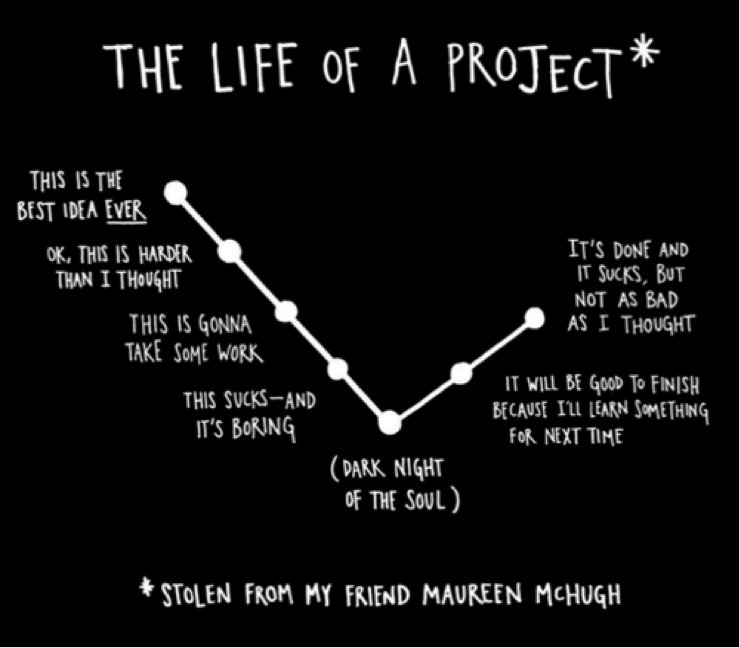TEDx Tested My Mettle
February 5, 2024 • Written by Julie Winokur
I’m not going to lie. The prospect of giving a TEDx Talk scared the shit out of me.
When the invite came, my first reaction was a sweet surge of adrenaline. I finally had been recognized as someone who has something worthwhile to say. My midnight fears of toiling in obscurity would be remedied by one 18-minute talk. I was going to join the ranks of people ordained by the Tedosphere to impart hard-earned wisdom to eager ears. I was up to the task!
But was I? Really? After the initial high wore off, I realized the task felt like a stretch. Did I actually have anything unique to offer? What topic did I have enough expertise to speak about flawlessly, inspirationally, irreproachably? I have been working for years on stories about immigration and environmental justice, but these are topics I document rather than my lived experience. I didn’t want to tell someone else’s story, but I couldn’t seem to wrangle my own expertise into a tidy topic. The more I thought about it, the more tangled my brain became. I did a crash course in TEDx Talks so I could decode what made some of them engrossing and memorable, and tried to imagine myself on that stage walking the tightrope between exceptionalism and relatability. (A shortlist of my favorites is below.) It all felt overwhelming.
The invite came out of the blue from Chris Ray, an inquisitive student at Rutgers University who is a member of his school’s TEDx Club. He found me down the Google rabbit hole and he pretty much gave me free reign to talk about whatever spirit moved me. He shared some guidelines to help me navigate the process and seemed completely confident that I would deliver, despite having absolutely no evidence to substantiate that. I chalked his enthusiasm up to naivete and began reviewing my decades of experience in search of a theme I could mine. I procrastinated for a month and then finally sent my brain on a vision quest.
To say that this process was challenging would be an understatement. It required time travel through my career, facing my demons, and rising to a task that required different muscles than I am used to flexing. Despite the fact that I give a lot of public presentations, this one felt like a beast. I am used to sketching out a loose outline for my public talks and engaging in a Q&A with the audience so the experience is more interactive than a lecture. I never memorize my presentation and I definitely don’t rehearse, not even in the mirror. I worried that rehearsing would rob the freshness from my delivery.
This was different. TEDx Talks are performative, and they require memorization and rehearsing. Nobody hops onto a TEDx stage and riffs from the gut without a plan. Let’s face it, the stakes are too high because it is recorded and shared widely. I confess that over the years I’ve given talks that run the gamut from poetic to rambling, but there is great comfort in knowing that only the people in the room will bear witness. That is liberating; knowing that if I fall on my face it will only inflict a fleeting wound. Not possible when the moment is immortalized.
I eventually settled on giving my talk about Bring It to The Table, a film and community engagement project aimed at breaking down the political divide. The project was a transformative personal experience where I challenged myself and others to practice what I call Radical Civility. Despite the fact that I launched Bring It over a decade ago, it only grows in relevance as civility continues to deteriorate in this country. The project has a natural life cycle that mirrors presidential elections, so it seemed like a timely topic at this moment.
Chris sent me some TEDx guidelines that provide a roadmap to help speakers distinguish between their idea, their journey and the throughline that makes a TEDx Talk successful. These principles are similar to crafting a documentary film, or any narrative for that matter, but when I started applying them to my life’s work, I couldn’t wrangle my thoughts into a tidy, cohesive story. They say doctors often make the worst patients and similarly, I saw myself, a professional storyteller, turn into a whining pile of gibberish when having to articulate my own story.
That’s where Cat McGrath, our stellar producer, came in. A woman of diverse talents, including a background in theater, Cat helped coax me out of the abyss of my brain and back to an earthly process of building a script. We began by transcribing a talk I gave at the Mackinac Policy Conference several years ago, and we then had several zoom sessions where, with Cat’s prompting, I did brain dumps that provided the raw materials for my talk. Zoom generated the transcripts and Cat culled the phrases that best communicated my complex musings. She then massaged the flow and kept insisting that we were having fun in the process.
Then we rehearsed and refined, refined and rehearsed, until I could recite back a script that retained a cadence and turns of phrase that felt relatively natural. What it lacked was all the padding and extraneous musings that dilute an audience’s attention. Up until the day of the event, I was not convinced I would remember the order of our carefully crafted script, or if my brain might freeze during the talk from overexertion. Now that we had a solid stream of words, could I actually perform?
Photo by Isabel Kashi
The students who organized the event at Rutgers could not have been more enthusiastic and appreciative. They created a welcoming environment that somehow felt unrelated to the hyper professional mainstage mindset you get when you watch a TEDx Talk online. What I encountered was comfortable, personable and at a human scale. After all the anticipation and anxiety, the day of the event proved totally unintimidating and, much to my relief, manageable.
With hindsight being 20/20, the journey to the TEDx stage was a mental climb to find my voice and embrace the value of my experience. It was an opportunity to take stock of old ideas and bring them forward through fresh framing. I was forced to learn new skills and overcome dread and as a result, I have a tremendous sense of accomplishment.
I am reminded of a graphic a colleague shared with me years ago that breaks down the life cycle of a project. From enthusiasm to suffering to success, I had gone through the same stages preparing for a TEDx Talk. I have new admiration and empathy for all the speakers who came before me and who will follow in the future. I withhold judgment because now I understand what this takes. To be on the other end of this process I can appreciate that TEDx speakers are mere mortals who have been loaned a cape for 18 minutes. With humility, I am honored to have climbed this proverbial mountain and come out clearer on the other side.
*My talk will be available in a few months, at which time we will share a link through social media.
A few of my favorite talks:
How to overcome our biases? Walk boldly toward them | Vernā Myers
What I learned from 100 days of rejection | Jia Jiang
The danger of a single story | Chimamanda Ngozi Adichie





